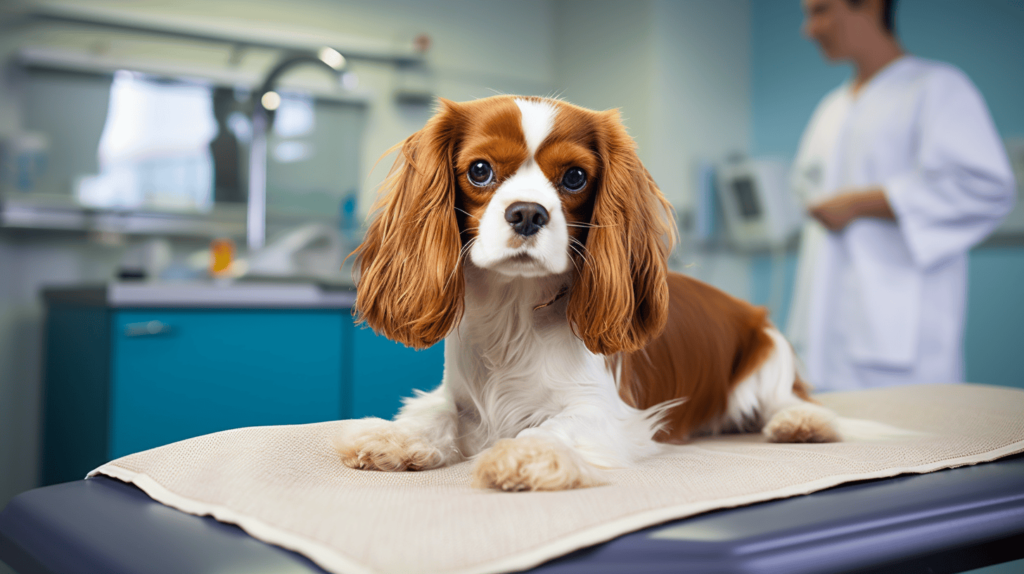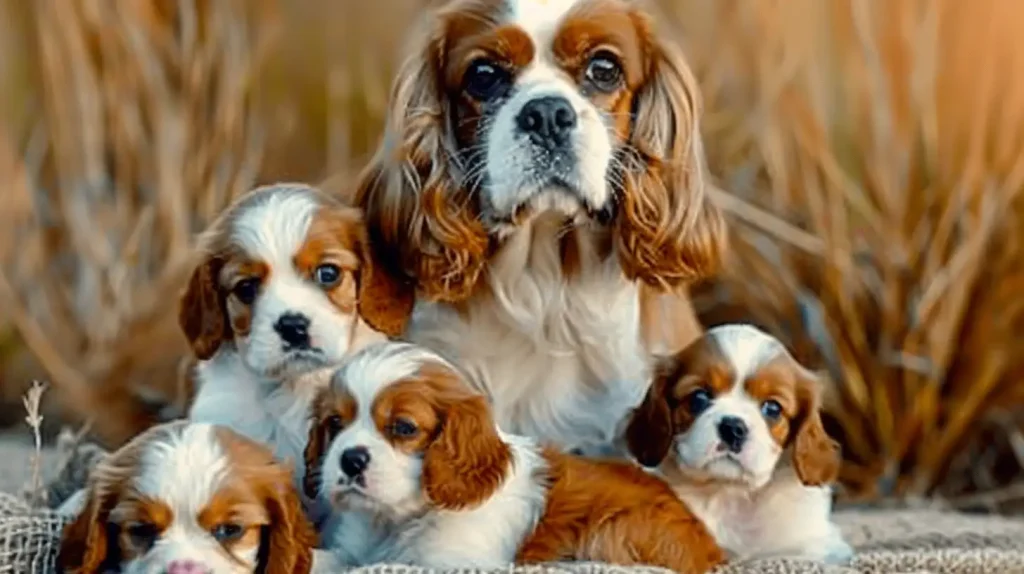Table of Contents
There’s something spellbinding about the Cavalier King Charles Spaniel. Their sparkling eyes, silky coats, and spirited personality captivate hearts worldwide. Perhaps you’ve welcomed one of these charming companions into your home. You might find yourself asking, “When will my Cavalier King Charles Spaniel puppy transition into full-grown majesty?”
Exploring a Cavalier King Charles Spaniel’s Growth: The Basics
Delving into the heart of a Cavalier King Charles Spaniel’s development, we encounter a blend of genetic engineering, dietary influences, and the beneficial effects of physical exertion. Unfurling the mystery surrounding these enchanting creatures, we find that the timeline of their growth is more of a fascinating chronicle than a rigid schedule.
Primarily, the cornerstone of growth is laid by genetics. These unique genetic codes dictate the dog’s ultimate size, color, and even temperamental traits. A Spaniel’s genes, passed down from its ancestors, encode the timeline for when its growth plates will close, thus ceasing growth.
Complementing genetics, nutrition plays a vital role in your Spaniel’s journey to adulthood. A balanced diet packed with essential nutrients, vitamins, and minerals facilitates a healthy development, shaping your dog’s physique and fortifying its immune system.
To make things more interesting, the growth journey is not devoid of physical activity. Exercise stimulates muscle development and joint flexibility, paving the way for a well-proportioned, agile, and hearty Spaniel. However, moderation is key, as over-exertion could lead to undue stress on the growing bones and joints.
As a general rule of thumb, the growth spurt for Spaniels usually plateaus between nine and fourteen months. However, remember that each Spaniel is as unique as a thumbprint. The growing timeline may waver slightly, so it’s crucial not to press the panic button if your Spaniel is a late bloomer or an early bird.
The Stages of a Cavalier King Charles Spaniel’s Development
Akin to the gripping chapters of a captivating novel, a Cavalier King Charles Spaniel’s development unfolds in a series of distinctive stages, each etched with its unique markers and milestones.
The narrative commences with the puppy stage, the introductory chapter that extends from the moment of birth until around the sixth-month mark. In this phase, you will bear witness to the rapid growth of your tiny Spaniel in terms of physical size and buoyant exuberance. The world is their stage, and every corner calls for exploration. Notably, the puppy stage is where the nascent character traits start to show, offering a sneak peek into the distinct personality that’s beginning to take shape.
Transitioning from the puppy stage, the adolescent phase begins, a stage that generally spans from six months to about a year. At this juncture, your Spaniel’s rate of growth might take the scenic route, slowly unfurling over time. But don’t be fooled by the deceleration of physical growth; their energy levels remain high, like a constant tide refusing to ebb. The adolescent phase also brings with it a possible whiff of rebellion as your Spaniel flexes their independence. Be patient, though, as this is merely a sign that your fur baby is progressing on the path of development.
The final chapter in this saga is adulthood, which typically graces a Cavalier King Charles Spaniel around the one-year mark. As they cross this threshold, the Spaniel’s physical growth draws to a leisurely pace. This stage is when your Spaniel starts to embody the quintessential traits that this breed is famed for: a serene and friendly demeanor coupled with an endearing loyalty. The rambunctious puppy energy subsides, replaced by a calm sophistication that marks the onset of adulthood.

How to Know When Your Cavalier King Charles Spaniel Is Full Grown
Discerning when your Cavalier King Charles Spaniel transitions from puppyhood to adulthood can be akin to solving a fascinating puzzle, with the pieces consisting of physical and behavioral cues.
Physical growth is perhaps the most noticeable signal of maturity. When growth stabilizes, it’s a telltale sign that your Spaniel is stepping into adulthood. Most Cavaliers, in their full glory, stand between 12 to 13 inches tall and weigh approximately 13 to 18 pounds. This height and weight stability heralds that your Spaniel has reached their full size. It’s akin to the closing chapter of their physical growth story.
However, the transformation from puppy to adult is not merely physical. Behavioral changes play an equally crucial role in signaling maturity. You will notice that the boundless energy of puppyhood mellows into a more tranquil temperament. The propensity for excited zoomies might be replaced with more leisurely and exploratory walks. This transition to calmness is a hallmark of a mature Cavalier King Charles Spaniel, a shift from the playful chaos of puppyhood to the composed grace of adulthood.
In addition, another subtle indication lies within training sessions. An adult Spaniel’s cognitive abilities will have developed, leading to an enhanced focus during training. You may notice them picking up new commands more efficiently or responding to cues with greater consistency. This newfound attentiveness is a clear nod to cognitive maturity, an implicit signal that your Spaniel is embracing the fullness of their potential.
Health Implications of a Full-Grown Cavalier King Charles Spaniel
As your Cavalier King Charles Spaniel segues into adulthood, certain health considerations begin to take center stage. Like in all breeds, adulthood is when certain breed-specific conditions may start to manifest, and Cavaliers are no exception.
One such condition to be cognizant of is mitral valve disease. This cardiac condition is regrettably common in mature Cavaliers. It affects the heart’s mitral valve, impairing its ability to regulate blood flow. Signs of mitral valve disease can include coughing, fatigue, and breathing difficulties. The disease can be managed with the right care, but early detection is key. Therefore, it becomes important to keep an eye out for any unusual symptoms and consult your vet promptly if any concerns arise.
The importance of regular vet check-ups cannot be overemphasized in this stage of your Spaniel’s life. These visits offer a vital opportunity for a professional to monitor your pet’s growth, keeping an eye on the completion of their physical development. Furthermore, these check-ups act as the first line of defense in spotting potential health issues. Early detection of problems can make a significant difference in the management and outcome of various conditions.

Caring for Your Full-Grown Cavalier King Charles Spaniel
The care for a full-grown Cavalier King Charles Spaniel hinges on nourishment, exercise, and consistent learning opportunities. A blend of these elements aids in fostering a balanced life for your mature Spaniel.
Nourishment for your adult Spaniel is not just about filling their food bowl; it’s about providing a diet rich in nutrients that cater to their mature physique. A dietary regimen saturated with high-quality proteins and healthy fats contributes to their energy levels, supports organ function, and facilitates a lustrous coat. Regular, portion-controlled feeding not only satiates their appetite but also aids in maintaining a healthy weight, a crucial aspect for their overall wellbeing.
Exercise remains a critical aspect of your Spaniel’s care as they transition into adulthood. Regular physical activity helps keep their heart healthy, their muscles strong, and their mind stimulated. From leisurely walks to playful fetching sessions, keeping them active contributes significantly to their physical and mental health.
Finally, while your Cavalier King Charles Spaniel might be an adult, their capacity for learning and their need for socialization remain undiminished. Regular training sessions help keep their cognitive abilities sharp. Socialization with other dogs and humans contributes to their emotional wellbeing, reinforcing their friendly demeanor.

Conclusion
As your Spaniel blossoms from puppy to adult, you’ll witness an enchanting transformation. Knowing when this metamorphosis culminates helps you provide the best care possible. Remember, every Cavalier King Charles Spaniel is unique, and their growth timeline may not adhere strictly to averages. However, armed with knowledge and an observant eye, you’ll be there for every exciting step of their journey. From rambunctious puppy to graceful adult, you’ll share unforgettable moments and unconditional love. Isn’t that the beauty of sharing life with a Cavalier King Charles Spaniel?
Key Takeaways
- Growth in Cavalier King Charles Spaniels is influenced by genetics, nutrition, and physical activity.
- Genetic codes determine the dog’s size, color, and temperamental traits, including the timeline for growth plate closure.
- A balanced diet with essential nutrients supports healthy development and strengthens the immune system.
- Exercise promotes muscle development and joint flexibility, but moderation is important to avoid stress on growing bones and joints.
- The growth spurt for Spaniels usually occurs between nine and fourteen months, but individual variations are normal.
- Cavalier King Charles Spaniel development unfolds in stages: puppyhood, adolescence, and adulthood.
- Physical growth stabilizes as the dog reaches adulthood, typically around one year old.
- Behavioral changes accompany maturity, with a transition from high energy to a more tranquil temperament.
- Cognitive abilities develop, leading to enhanced focus during training in adult Spaniels.
- Health considerations in adulthood include monitoring for mitral valve disease and regular vet check-ups.
- Nourishment should focus on a balanced diet with high-quality proteins and healthy fats for energy and organ function.
- Regular exercise supports heart health, muscle strength, and mental stimulation in adult Spaniels.
- Continued training and socialization contribute to cognitive abilities and emotional well-being.
- Every Cavalier King Charles Spaniel is unique, and their growth timeline may vary.
- Sharing life with a Cavalier King Charles Spaniel brings unforgettable moments and unconditional love.
COPYRIGHT NOTICE
Please be advised that all images, designs, and creative content on this page are the exclusive property of Spanielhub.com and are protected under international copyright laws. The images may not be reproduced, copied, transmitted or manipulated without the written permission of Spanielhub.com.
Unauthorized use, distribution, display, or creation of derivative works of any images contained on this page, is strictly prohibited and can lead to legal penalties. We actively monitor for, and enforce, our copyright interests.
If you wish to use any of our images, kindly contact us to seek permission. Respect of copyright is not merely a legal requirement but also an acknowledgement and support of the hard work and creativity that goes into producing them.
Thank you for your understanding and cooperation.
© 2023, Spanielhub.com. All Rights Reserved.



